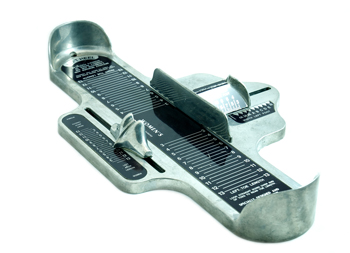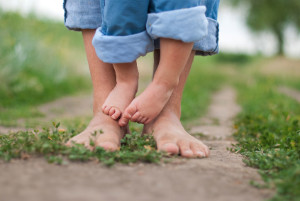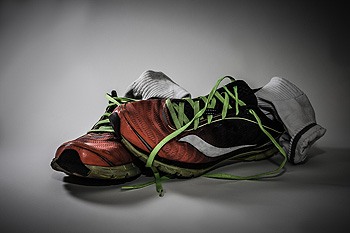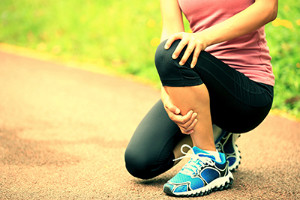Items filtered by date: September 2019
Do Your Child's Feet Hurt?
What Is a Brannock Device?
 Research has shown the importance of properly measuring your feet before shoes are purchased. This can be done by using a Brannock device which is found in the majority of shoe stores. It is helpful to measure your feet and try shoes on during the afternoon, when the feet are typically at their largest for the day. A properly fitting shoe should feel comfortable when tried on, and will have adequate room for the toes to move freely in. It can help to determine the correct shoe size by wearing socks that would be worn with the shoes, in addition to walking on carpeting and hard surfaces before you decide to purchase them. If your foot becomes irritated, the shoes may have tags on the inside of them which need to be removed. If you have any questions about how to buy shoes that fit properly, please consult with a podiatrist.
Research has shown the importance of properly measuring your feet before shoes are purchased. This can be done by using a Brannock device which is found in the majority of shoe stores. It is helpful to measure your feet and try shoes on during the afternoon, when the feet are typically at their largest for the day. A properly fitting shoe should feel comfortable when tried on, and will have adequate room for the toes to move freely in. It can help to determine the correct shoe size by wearing socks that would be worn with the shoes, in addition to walking on carpeting and hard surfaces before you decide to purchase them. If your foot becomes irritated, the shoes may have tags on the inside of them which need to be removed. If you have any questions about how to buy shoes that fit properly, please consult with a podiatrist.
Finding a properly-fitting shoe is important in reducing injuries and preventing foot problems. For more information about treatment, contact Dr. Joshua David Scoll from Pennsylvania. Our doctor will treat your foot and ankle needs.
Proper Shoe Fitting
A common concern when it comes to foot health, having properly fitted shoes can help prevent injuries to the foot. Out feet affect our posture and gait, which in turn affects the biomechanics and overall bodily structure. With 33 joints, 26 bones, and over 100 ligaments, the potential for serious injury is much greater than one realizes. Although the feet cease growth in adulthood, they still change shape as they mature. Here are some factors to consider when it comes to investing in proper fitting shoes:
- Be sure the shoes fit correctly right away
- Ensure the ball of your foot fits comfortably in the widest portion of the shoes
- Even though they may look fashionable, improper fitting shoes can either create adverse conditions or exacerbate existing ones you may already have
- Walk along a carpeted surface to ensure the shoes comfortably fit during normal activity
Keeping in mind how shoes fit the biomechanics of your body, properly-fitting shoes are vitally important. Fortunately, it is not difficult to acquire footwear that fits correctly. Be sure to wear shoes that support the overall structure of your body. Do your feet a favor and invest in several pairs of well-fitted shoes today.
If you have any questions please feel free to contact one of our offices located in Philadelphia, Bensalem, and Fairless Hills, PA . We offer the newest diagnostic and treatment technologies for all your foot and ankle needs.
What Can Cause A Stress Fracture?
Stress fractures are known to be small cracks in the bones of the feet that gradually appear as a result of repeated stress. Patients who participate in running and jumping activities may be prone to developing this type of injury. Additionally, existing medical conditions may precede developing a stress fracture, and these may include arthritis and osteoporosis. Some of the symptoms that are associated with this condition often consist of pain and discomfort in a large area of the foot, and can be more noticeable while standing or walking. After a proper diagnosis is performed, which often includes having an X-ray or MRI taken, the correct treatment can begin. If you believe you have a stress fracture, It is recommended that you speak to a podiatrist who can present you with proper treatment options.
Stress fractures occur when there is a tiny crack within a bone. To learn more, contact Dr. Joshua David Scoll from Pennsylvania. Our doctor can provide the care you need to keep you pain free and on your feet.
How Are They Caused?
Stress fractures are the result of repetitive force being placed on the bone. Since the lower leg and feet often carry most of the body’s weight, stress fractures are likely to occur in these areas. If you rush into a new exercise, you are more likely to develop a stress fracture since you are starting too much, too soon. Pain resulting from stress fractures may go unnoticed at first, however it may start to worsen over time.
Risk Factors
- Gender – They are more commonly found in women compared to men.
- Foot Problems – People with unusual arches in their feet are more likely to develop stress fractures.
- Certain Sports – Dancers, gymnasts, tennis players, runners, and basketball players are more likely to develop stress fractures.
- Lack of Nutrients – A lack of vitamin D and calcium may weaken the bones and make you more prone to stress fractures
- Weak Bones – Osteoporosis can weaken the bones therefore resulting in stress fractures
Stress fractures do not always heal properly, so it is important that you seek help from a podiatrist if you suspect you may have one. Ignoring your stress fracture may cause it to worsen, and you may develop chronic pain as well as additional fractures.
If you have any questions, please feel free to contact one of our offices located in Philadelphia, Bensalem, and Fairless Hills, PA . We offer the newest diagnostic and treatment technologies for all your foot care needs.
Children and Walking Barefoot While Indoors
 Many parents understand the importance of having their toddlers walk barefoot while indoors. This is helpful in strengthening the toes and the top of the feet as they grasp the floor. Additionally, it can promote balance, coordination, and good posture. Research has shown that many babies are born with flat feet, and the arch will generally develop as they are in their teenage years. When children start to walk outside, it is beneficial to have their feet properly measured, and this is helpful in determining the correct size shoe. When the first shoes are purchased, it is important to ensure there is adequate room for the toes to move freely in. If you notice your child walks with their feet pointed inward or outward, it is suggested that you schedule a consultation with a podiatrist who can properly monitor any foot condition.
Many parents understand the importance of having their toddlers walk barefoot while indoors. This is helpful in strengthening the toes and the top of the feet as they grasp the floor. Additionally, it can promote balance, coordination, and good posture. Research has shown that many babies are born with flat feet, and the arch will generally develop as they are in their teenage years. When children start to walk outside, it is beneficial to have their feet properly measured, and this is helpful in determining the correct size shoe. When the first shoes are purchased, it is important to ensure there is adequate room for the toes to move freely in. If you notice your child walks with their feet pointed inward or outward, it is suggested that you schedule a consultation with a podiatrist who can properly monitor any foot condition.
Making sure that your children maintain good foot health is very important as they grow. If you have any questions, contact Dr. Joshua David Scoll of Pennsylvania. Our doctor can provide the care you need to keep you pain-free and on your feet.
Keeping Children's Feet Healthy
Having healthy feet during childhood can help prevent medical problems later in life, namely in the back and legs. As children grow, their feet require different types of care. Here are some things to consider...
Although babies do not walk yet, it is still very important to take care of their feet.
Avoid putting tight shoes or socks on his or her feet.
Allow the baby to stretch and kick his or her feet to feel comfortable.
As a toddler, kids are now on the move and begin to develop differently. At this age, toddlers are getting a feel for walking, so don’t be alarmed if your toddler is unsteady or ‘walks funny’.
As your child gets older, it is important to teach them how to take care of their feet.
Show them proper hygiene to prevent infections such as fungus.
Be watchful for any pain or injury.
Have all injuries checked by a doctor as soon as possible.
Comfortable, protective shoes should always be worn, especially at play.
If you have any questions please feel free to contact one of our offices located in Philadelphia, Bensalem, and Fairless Hills, PA . We offer the newest diagnostic and treatment technologies for all your foot and ankle needs.
How Long Do Running Shoes Last?
 People who enjoy the sport of running or jogging understand the importance of purchasing running shoes that conform to the shape of the foot. Additionally, it is beneficial to anticipate the amount of miles and the type of running that you want to achieve. When the correct shoes are worn, possible injuries can be prevented. Research has indicated that wear and tear of running shoes can begin at approximately 500 miles, and it is recommended to replace them at that time. Running shoes can last even longer when they are alternated with another pair of shoes. When purchasing shoes, it is more advantageous to try shoes on in the middle of the day when the feet are at their largest. It is also helpful to know that a solid heel can provide the stability that is necessary to ensure safe running. If you would like additional information about how to decide on what running shoe is best for you, please consult with a podiatrist.
People who enjoy the sport of running or jogging understand the importance of purchasing running shoes that conform to the shape of the foot. Additionally, it is beneficial to anticipate the amount of miles and the type of running that you want to achieve. When the correct shoes are worn, possible injuries can be prevented. Research has indicated that wear and tear of running shoes can begin at approximately 500 miles, and it is recommended to replace them at that time. Running shoes can last even longer when they are alternated with another pair of shoes. When purchasing shoes, it is more advantageous to try shoes on in the middle of the day when the feet are at their largest. It is also helpful to know that a solid heel can provide the stability that is necessary to ensure safe running. If you would like additional information about how to decide on what running shoe is best for you, please consult with a podiatrist.
If you are a runner, wearing the right running shoe is essential. For more information, contact Dr. Joshua David Scoll from Pennsylvania. Our doctor can provide the care you need to keep you pain-free and on your feet.
Choosing the Right Running Shoe for Your Foot Type
To increase performance and avoid the risk of injury, it is important to choose the right running shoe based on your foot type. The general design of running shoes revolves around pronation, which is how the ankle rolls from outside to inside when the foot strikes the ground.
- Neutral runners are able to choose from a wide variety of shoes, including minimalist shoes or even going barefoot.
- Runners who overpronate, or experience an over-abundance of ankle rolling, should choose shoes that provide extra motion control and stability.
- Runners who underpronate, or supinate, have feet that have high arches and lack flexibility, preventing shock absorption. They require shoes with more flexibility and cushion.
If you have any questions please feel free to contact one of our offices located in Philadelphia, Bensalem, and Fairless Hills, PA . We offer the newest diagnostic and treatment technologies for all your foot and ankle needs.
Sports and Achilles Tendon Injuries
 People who participate in sporting activities may experience Achilles tendon injuries. If it is torn, surgery may be necessary to repair the tendon, and a lengthy recovery period is often needed. The Achilles tendon is located in the back of the calf, and its purpose is to connect the heel to the calf muscles. It may become injured if sudden jumping or sprinting is performed. This may occur if certain sports are played that can include volleyball and basketball. There are existing conditions which could weaken the Achilles tendon. These can consist of diabetes, specific forms of arthritis that can include gout, or if certain medications are taken. The symptoms that are often associated with this condition can include difficulty in walking, and there may be severe pain while attempting to point and flex the foot. If you have endured an Achilles tendon injury, it is advised to speak with a podiatrist who can guide you toward the proper treatment.
People who participate in sporting activities may experience Achilles tendon injuries. If it is torn, surgery may be necessary to repair the tendon, and a lengthy recovery period is often needed. The Achilles tendon is located in the back of the calf, and its purpose is to connect the heel to the calf muscles. It may become injured if sudden jumping or sprinting is performed. This may occur if certain sports are played that can include volleyball and basketball. There are existing conditions which could weaken the Achilles tendon. These can consist of diabetes, specific forms of arthritis that can include gout, or if certain medications are taken. The symptoms that are often associated with this condition can include difficulty in walking, and there may be severe pain while attempting to point and flex the foot. If you have endured an Achilles tendon injury, it is advised to speak with a podiatrist who can guide you toward the proper treatment.
Achilles tendon injuries need immediate attention to avoid future complications. If you have any concerns, contact Dr. Joshua David Scoll of Pennsylvania. Our doctor can provide the care you need to keep you pain-free and on your feet.
What Is the Achilles Tendon?
The Achilles tendon is a tendon that connects the lower leg muscles and calf to the heel of the foot. It is the strongest tendon in the human body and is essential for making movement possible. Because this tendon is such an integral part of the body, any injuries to it can create immense difficulties and should immediately be presented to a doctor.
What Are the Symptoms of an Achilles Tendon Injury?
There are various types of injuries that can affect the Achilles tendon. The two most common injuries are Achilles tendinitis and ruptures of the tendon.
Achilles Tendinitis Symptoms
- Inflammation
- Dull to severe pain
- Increased blood flow to the tendon
- Thickening of the tendon
Rupture Symptoms
- Extreme pain and swelling in the foot
- Total immobility
Treatment and Prevention
Achilles tendon injuries are diagnosed by a thorough physical evaluation, which can include an MRI. Treatment involves rest, physical therapy, and in some cases, surgery. However, various preventative measures can be taken to avoid these injuries, such as:
- Thorough stretching of the tendon before and after exercise
- Strengthening exercises like calf raises, squats, leg curls, leg extensions, leg raises, lunges, and leg presses
If you have any questions please feel free to contact one of our offices located in Philadelphia, Bensalem, and Fairless Hills, PA . We offer the newest diagnostic tools and technology to treat your foot and ankle needs.


